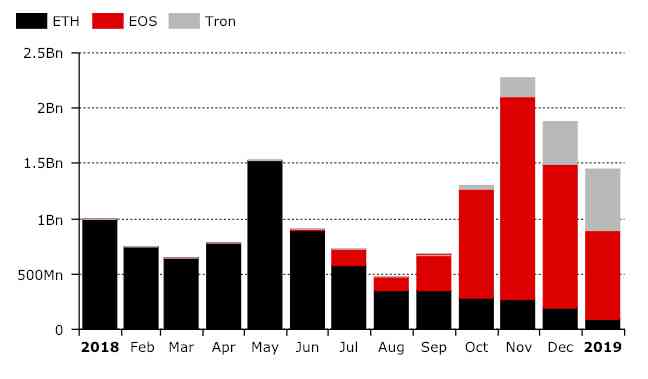Cryptocurrency gamblers have left Ethereum-based decentralized apps (dApps) en masse. They’ve converted almost entirely to gambling on competing networks, taking their transactional volume with them.

Blockchain research unit Diar studied three blockchains that support dApps, Ethereum, EOS, TRON, to determine just how much US dollar value is processed on each network – and by what kind of dApp.
It discovered that dApps deployed on EOS and TRON are now responsible for 94 percent of all the US dollar value transacted across the three protocols.


Surprisingly, 55 percent of that traffic is coming from EOS , and 36 percent is flowing through dApps deployed on Justin Sun’s TRON network .
Most of it is the result of gambling. Since its rocky inception last year , the EOS network has processed more than $5.5 billion worth of cryptocurrency – with 70 percent now attributed to its gambling-specific dApps.
TRON traffic is made up of a similarly startling amount of online casinos. Diar noted more than 95 percent of TRON traffic is gambling-related.
By comparison, Ethereum‘s gambling dApps now account for a relatively tiny 2 percent of the network’s US dollar transactional volume. This is despite nearly half of Ethereum dApps being betting-related.
Instead of gambling, a lot of Ethereum traffic is made up of cryptocurrency trading on decentralized exchanges – but analysts found even those are struggling to maintain rates of adoption .
Diar claims gambling is “inherently high-volume trading.” This means any blockchain hosting gamblers will inevitably see a disproportionate rise in “on-chain” USD traffic.
Gambling dApps have been soft targets in the past
EOS-based gambling dApps were once notorious for security incidents, after string of coding failures rocked a number of betting platforms.
The troubles started in the months following its launch, when a hacker exploited “decentralized” dice game DEOSGames to “win” its $1,000 jackpot 24 times in a row.
Less than a week later, attackers ransacked rival dApp EOSBet, hacking its poorly-coded smart contract to steal 40,000 EOS , worth over $200,000 at the time.
In the days beforehand, EOSBet ironically bragged about the robustness of its security on social media. It was then hit by thieves again – this time estimates suggest they made off with $338,000 in EOS tokens.
While proponents of EOS and TRON might laud the adoption of their blockchain by the internet’s decentralized gamblers, the success of those dApps hinge almost entirely on the security of their smart contract code – so they had better be ready for the inevitable attack.
eToro officially launches its cryptocurrency exchange in the US
After months of anticipation , social trading platform eToro has finally launched its cryptocurrency-to-cryptocurrency exchange desk in the US.

At present, the service will only support cryptocurrency trading, but the plan is to gradually add other assets to the platform. eToro’s new exchange will be available in 32 states, though the full list is not yet available.
In addition to the exchange, eToro is also bringing its standalone cryptocurrency wallet – available for both iOS and Android – to US-based users.
At launch, eToro will support trading for 13 different cryptocurrencies, but is yet to specify which ones.
For the record, its flagship platform allows trading in Bitcoin (BTC), Ethereum (ETH), Bitcoin Cash (BCH), Ripple (XRP), Dash (DASH), Litecoin (LTC), Ethereum Classic (ETC), Stellar Lumens (XLM), NEO (NEO), EOS (EOS), IOTA (MIOTA), Cardano (ADA), Zcash (ZEC), and Binance Coin (BNB).
The wallet, on the other hand, will support six currencies, including BTC, ETH, LTC, BCH, XRP, and XLM. However, eToro promises support for more coins is coming soon.
“When I founded eToro, I envisioned a community where people could trade, invest and share their knowledge in a simple and transparent way,” said founder Yoni Assia. “eToro also acts as a bridge between the old world of investing and a blockchain-powered future, helping our users navigate and benefit from the transition to crypto-assets for wealth building.”
“People create the eToro experience and now Americans will play a major role in shaping our community and future,” he added.
eToro first teased plans about expanding its cryptocurrency exchange operation to the US in May 2018. The news came shortly after the company announced it had secured $100 million in funding from SBI Group, Korea Investment Partners, and The World-Wide Investment Company Limited.
Nice: Firefox 69 now blocks cryptominers and tracking cookies by default
Mozilla, the creator of the popular Firefox browser, has announced it plans to block cryptominers by default. The move will ensure that third-party websites are unable to use the computational resources of visitors without consent.

The use of cryptominers – which is dubbed “cryptojacking” – allows websites to monetize their users without showing traditional advertising. Although this is visually inobtrusive, these scripts inevitably result in performance slowdowns and reduced battery life for mobile users. Experts from SonicWall estimate over 52.7 million visits to cryptojacker-infected websites were made during the first six months of 2019.
In addition, starting from today, Firefox will automatically block third-party tracking cookies. These are used by advertising networks to show relevant adverts based on previous browsing activity. For good reason, tracking cookies are widely regarded as intrusive and harmful to privacy.
Mozilla is currently rolling out these new privacy features across Firefox for both desktop and Android. Both new and existing users will be able to take advantage of these features.
Firefox users can now also block fingerprinting scripts – although, at present, Mozilla hasn’t elected to turn this feature on by default.
Fingerprinting is another tactic employed by third-party advertising networks to track users across disparate websites. The tactic works by creating a snapshot of a computer’s configuration using sophisticated JavaScript programs. This is often unique enough to pinpoint a specific user.
In recent years, Mozilla has chosen to market Firefox by emphasizing the privacy and security features of the browser. This move will only increase the open-source browser’s value proposition.
Of course, Mozilla isn’t necessarily a trailblazer here. Opera introduced cryptojacker blocking in January of 2018 .
Similarly, during that year, Google began delisting extensions with that mine cryptocurrencies in the background.
Sadly, it is yet to do anything about the prevalence of in-browser cryptojacking scripts, which frequently pop-up on adult and filesharing websites, as well as legitimate webpages that have been compromised by a third-party .











